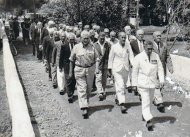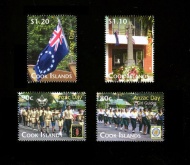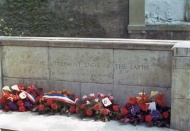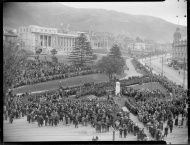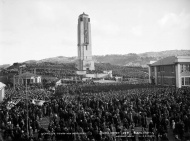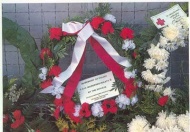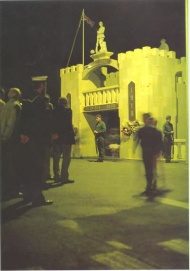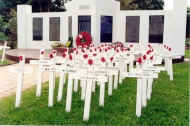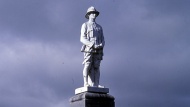Events In History
-
 24 April 1922New Zealand's first poppy day
24 April 1922New Zealand's first poppy dayA total of 245,059 small poppies and 15,157 larger versions were sold, earning £13,166. Of that amount, £3,695 was sent to help war-ravaged areas of northern France; the remainder went to unemployed returned soldiers and their families. Read more...
-
 25 April 1916The first Anzac Day
25 April 1916The first Anzac DayOn 25 April 1916, communities around New Zealand and overseas gathered to commemorate the first anniversary of the Gallipoli landings. Read more...
-
 25 April 1915NZ troops land at Gallipoli
25 April 1915NZ troops land at GallipoliNew Zealand troops were part of the Allied invasion force that landed at what soon became known as Anzac Cove. About one-sixth of the New Zealanders who served on Gallipoli were killed. Read more...
Articles
The Gallipoli campaign

Each year on Anzac Day, New Zealanders (and Australians) mark the anniversary of the Gallipoli landings of 25 April 1915. On that day, thousands of young men, far from their homes, stormed the beaches on the Gallipoli Peninsula in what is now Turkey.
-
Page 10 – Gallipoli biographies
Find out more about some of the New Zealanders involved in the Gallipoli campaign between April 1915 and January 1916.
Anzac Day

First observed in 1916, Anzac Day - 25 April - commemorates those killed in war as well as honouring returned servicemen and women. The ceremonies that are held at war memorials across the country, or in places overseas where New Zealanders gather, are rich in tradition and ritual.
-
Page 2 – The Anzacs
The word Anzac is part of the culture of New Zealanders and Australians. The word conjures up a shared heritage of two nations, but it also has a specific meaning, dating from
-
Page 3 – The ceremony
The Anzac Day ceremony of 25 April is a form of military funeral and follows a particular pattern. The day's ceremonies have two major parts: one at dawn and another, more
-
Page 4 – The making of Anzac Day
Anzac Day was made a half-day holiday in 1916, and the pattern of the day's events that occur now began at that time.
-
Page 5 – A sacred holiday
Anzac Day became a public holiday and took on new meaning in a time of peace. It became a time to express sorrow, not glorify war, and was a sacred day that had a secular tone
-
Page 6 – Another war and peace
Anzac Day came to have a wider focus and the commemorations became more popular in the years after the Second World War.
-
Page 7 – Modern Anzac Day
Each generation of New Zealanders redefines Anzac Day to suit the mood of the times, but the last 40 years have been a time of much redefinition.
-
Page 8 – Fatalities
This list of 147 fatalities of the New Zealand Expeditionary Force (NZEF) was collated from Commonwealth War Graves Commission records. The exact date of death cannot be
-
Page 9 – The red poppy
The red poppy has become a symbol of war remembrance the world over. In many countries it is worn around Armistice Day (11 November), but in New Zealand it is most commonly
-
Page 10 – Further information
Links and books relating to Anzac Day
Anzac Day social studies activities

The Classroom supports teachers and students of various curriculum levels in their study of Anzac Day. These activities and teaching ideas can be used as they are or adapted to suit the particular needs of your classes.
-
Page 3 – Anzac Day quiz
Do a quiz to find out what students know about Anzac Day
Anzac Day in the Pacific

Armistice Day was the initial focal point for commemorations in the Cook Islands and Niue after the First World War. But because men from both countries had served in the New Zealand Expeditionary Force, observances gradually shifted to Anzac Day in April
-
Page 2 – Early commemorative efforts
During the 1920s war memorials provided a focus for commemoration services in the Cook Islands, where the first Anzac Day service was possibly held in 1927. On Niue, Armistice
-
Page 3 – The growth of Anzac Day
By the end of the Second World War military commemorations in the Cook Islands and Niue centered around Anzac Day. Services in both countries followed the pattern of those in
-
Page 4 – Present day commemorations
In the new millennium there has been increasing interest in the story of Pacific Island involvement in the First World War. In the Cook Islands there have been efforts to
-
Page 5 – Further information
Books and further reading relating to the history of Anzac Day in the Pacific Islands of Niue and the Cook Islands
War and remembrance

War has played a defining role in shaping our nation since we first sent troops overseas to South Africa in 1899. As the centenary of the the First World War (2014-18) approaches, many New Zealanders will reflect on our nation's experiences of war and the impact of conflict on our society.
- Page 1 - War and remembrance activitiesWar has played a defining role in shaping our nation since we first sent troops overseas to South Africa in 1899. As the centenary of the the First World War (2014-18) approaches,
The 1920s

The 1920s was the decade that modern New Zealand came of age. Despite political and economic uncertainty, the country shrugged off the gloom of war to embrace the Jazz Age - an era of speed, power and glamour. Explore an overview of the decade and a year-by-year breakdown of key events.
- Page 4 - 1921 - key eventsA selection of key New Zealand events from
Related keywords
- public service
- roll of honour
- education
- war memorials
- tinui
- WW1
- cook islands
- niue
- pacific islanders
- cemeteries
- royalty
- dawn service
- public holidays
- RSA
- stamps
- rarotonga
- red poppy
- classroom activities
- gallipoli campaign
- anzac cove
- le quesnoy liberation
- parliament buildings
- wellington city
- wellington cenotaph
- kingitanga
- maori leaders
- 1920s
- australia
- carillon
- national war memorial
- te aroha
- picton
- auckland domain
- cambridge
- window
- radio broadcasts
- patea
- petone
- railway stations
- WW1 home front
- protest
- WW2
- religion
- holidays
- sling camp
- anzac
- commonwealth war graves commission
- death
- north african campaign
- egypt
- national identity
- william malone
- alexander godley
- george bollinger
- evelyn brooke
- horace moore-jones
- WW1 stories
- ohinemutu
- parades
- music
- poetry
- ottoman empire
- turkey
- memorials
-
Main image: Ministry of Education Anzac Day service
Ministry of Education Anzac Day service, 2015



